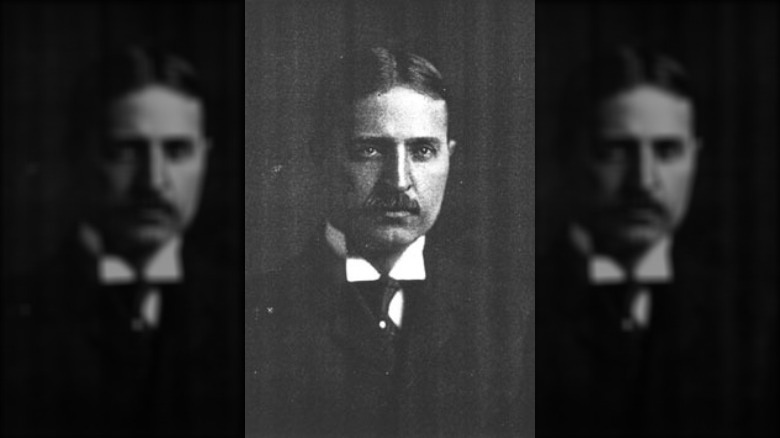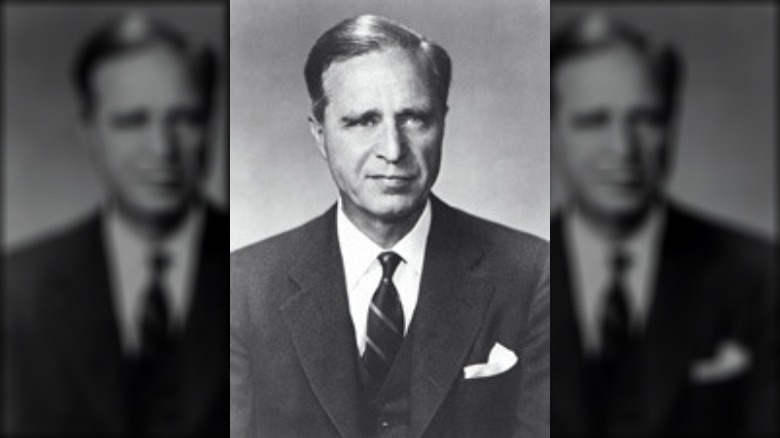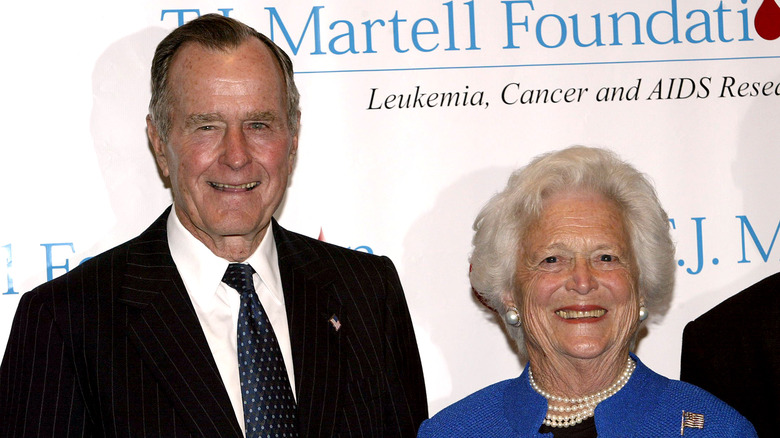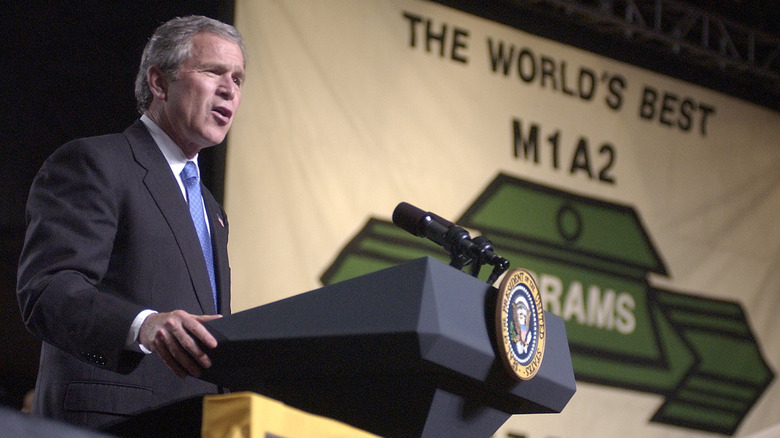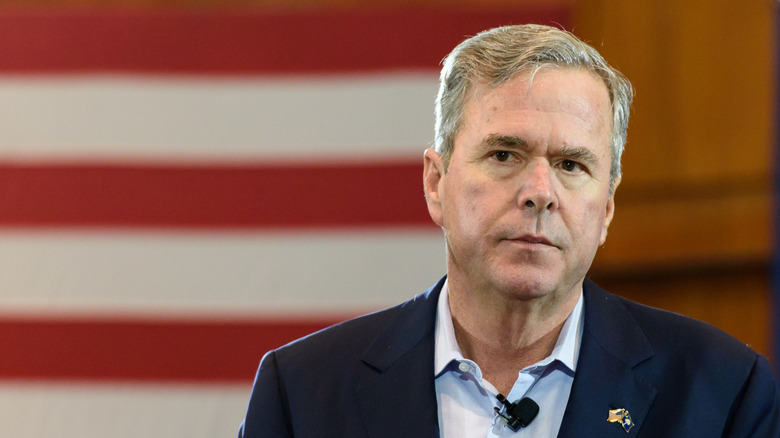The Bush Family Tree Explained
The United States of America is a place where all one needs to move up the social ladder is a hearty work ethic and a tough pair of bootstraps to pull on. So they say. There are a few things that give one a leg up on those of us who weren't born with the boots on in the first place. Although half the country would prefer not to admit it, being white definitely helps. It also helps to have really rich great grandparents.
Such is the situation in which the Bush family finds itself. CNN called the Bushes a "famously secretive family" that has produced some of the most influential figures in American history. A pair of presidents, some governors, U.S. Senators, and powerful businessmen dot the branches of this prominent family tree. And one of them started the longest war in the country's history, then started another a couple years later under what were found to be disastrously false pretenses, as noted by NBC News.
But exactly how did the Bush family get so rich and end up wielding such extreme power in a country ostensibly of, by, and for the people? Let's take a look back through the several generations of the Bush family tree to see.
The generational wealth that started the Bush family dynasty
According to a detailed Bush family tree published by The Wall Street Journal, it all started five generations ago, when Samuel Prescott Bush (pictured above) made a fortune in the steel industry. Samuel was born in New Jersey in 1863, he was educated as an engineer and started a career in the bustling railroad industry. This Bush was a Democrat, but back then Democrat meant more or less what Republican means today (minus the shameless personality worship and outlandish conspiracy theories). He espoused such conservative ideals as business, industry, and, of course, giving as little back to society as possible. In addition to serving in the U.S. Chamber of Commerce, he also founded a group that opposed paying taxes. Samuel married Flora Sheldon in 1894, but she died tragically in a car crash in 1920. They had a son, Prescott Sheldon Bush.
George Herbert Walker was another rich Bush descendant who helped create the wealth that would sustain his family dynasty for over a century. Born in 1874, he worked as an investment banker and lived the good life in New York City, complete with expensive cars, fancy foods, and a pair of butlers to boot. But he also had a terrible temper that his wife Loulie Wear was forced to tolerate throughout their marriage. Their daughter Dorothy Walker married Prescott Sheldon Bush in 1921.
The generation that gave the US its first Bush president
Prescott Sheldon Bush (pictured above) was born in 1895 in Columbus, Ohio. He studied at Yale and afterward served in World War I leading an artillery unit in France. After the war, he entered the investment banking business and in 1931 became a partner at a financial firm. He cashed in while the rest of the country was reeling from the devastating effects of the 1929 stock market crash and subsequent Great Depression. After years of side-hustling in local politics, he went full-on Senator for a time in the 1950s. As you might expect from the few details you already know about him, he was not an easy-going guy. According to Time, he was a very stern man who obliged his own children to call him "Senator," rather than the classic, "dad."
Born in 1902, his wife Dorothy was just 18 years old when they were married. She was well-educated and an accomplished athlete. According to Business Insider, their union produced five children, but one would go on to stand out above the rest: George Herbert Walker Bush. The Journal told a funny anecdote of how strict she was about manners. Once, when George was still vice president, she scolded him for reading the text of a speech that President Ronald Reagan was giving, as she considered such a thing to be impolite.
The Bush family makes it to the presidency
Prescott and Dorothy had George Herbert Walker Bush in 1924. The family was loaded, and little George grew up in a life of luxury in which there was always a servant to do the things rich people have no time for: drivers, cooks, maids, etc. The Journal noted how he was an ok student, but a star in the sports world. His election to president in 1988 capped off a long career of public and military service. He was a Navy pilot in World War II, and survived his plane being shot down by Japanese anti-aircraft fire in the Pacific. Like his dad, he attended Yale, and afterward moved to Texas to strike it rich in the oil industry. He started out in politics as a congressman in 1966, and went on to serve as chairman of the Republican National Convention. He was also U.S. ambassador to the United Nations, a diplomat to China, and head of the CIA for a while before being elected to the White House alongside Ronald Reagan in 1980.
This Bush married Barbara Pierce in 1945, dutifully following her husband to Texas, Washington D.C., and everywhere else his storied career took him. As First Lady, she worked to promote literacy among the adult U.S. population. She came from a similarly distinguished branch of athletes, businessmen, and public servants. They had six children together, one of whom would follow in his father's presidential footsteps. She and her husband both died in 2018, just a few months apart from each other.
George W. Bush started the longest war in U.S. history
Of those six offspring from George Herbert Walker and Barbara Bush, their son George W. stood out among the rest. An extremely controversial political figure at the turn of the 21st century, W. — as he came to be known colloquially — was president at the time of the attacks on the World Trade Center in New York City on September, 11, 2001. Several conspiracy theories and other myths about 9/11 tried to point a finger at him, but they never appeared to hold anything of substance to prove he had something to do with the attacks. However, the attacks were enough to justify his declaration of war against an intangible entity: Terror.
That War on Terror was actually two disastrous military interventions in the Middle East, one in Afghanistan, which began in 2001, and another one in Iraq in 2003. Despite W.'s obviously far too premature declaration of "Mission Accomplished" in May 2003 (per History), the wars continued for years. The Iraq War ended in 2011, but the one in Afghanistan dragged on and on for two full decades — the longest in U.S. history — and ended in swift calamity in 2021. The Washington Post reported the terrible costs of that catastrophic conflict in August 2021, just after the Taliban recovered control of Afghanistan in a matter of days: hundreds of thousands dead and a price tag totaling more than $2 trillion. Mission accomplished, indeed.
The Bush family's continued political aspirations
The most notable of W.'s siblings to enter politics was John Ellis "Jeb" Bush (pictured above), who served as governor of Florida a couple times, and attempted to follow his big brother's footsteps all the way to the White House in 2016. His campaign, however, wasn't able to withstand the one-two punch of the inheritance of his brother's disastrous legacy and then presidential candidate Donald Trump's personal attacks (CNN reported that Trump called Bush an "embarrassment to his family").
The family tree published by The Journal noted that W. and Jeb's little brother Neil helped their dad out on his 1980 presidential campaign, but didn't delve any further into politics. Instead, he got caught up in a savings and loan scam that cost the government around $1 billion to clean up. (Starting to see a pattern here of what the Bush family likes to do with U.S. taxpayer dollars?)
Among the newest generation of Bushes is Jeb's son George Prescott Bush, who, in addition to having the same names as everyone else in his family tree, is apparently trying to be an exact copy of their lives, as well. A distinguished athlete, former military officer, and investment banker, he was elected to the office of Texas Land Commissioner in 2015. If he makes it to the Oval Office someday, hopefully he doesn't try to outshine his uncle's hawkish legacy of accomplishing missions without fully considering the consequences of his actions.

